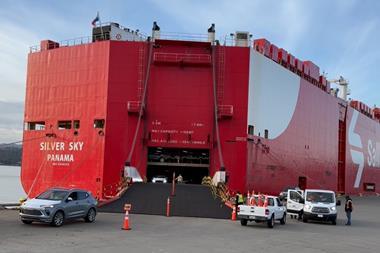
As delegates gear up for next week's Automotive Logistics Russia conference in Moscow the persistent problem of haulage licence permits for transport between Russia and Poland has resurfaced, with Russia cutting permits for haulage and implementing steep fines for invalid ones in an effort to protect domestic transport providers.
Poland's quota of overland freight permits has been reduced to 150,000, down from 190,000, in line with the number of permits it allocates its domestic transport providers entering Poland and the EU market, also at 150,000. Industry sources say this could slow the movement of vehicles and parts to and from the country and force shippers to use exclusively Russian transport providers.
Poland has a significantly higher number of transport companies moving goods internationally, somewhere between 22,000-24,000 compared to a far lower number based in Russia and the restrictions are being imposed to protect the Russian transport companies, according to Frost and Sullivan consultant Dominik Buszta.
Quoting Eurostat figures he said that in 2009 Polish transport companies gained 15% market share in Europe and added that around 20%-25% of routes to and from Russia are served by Polish transport companies.
Buszta told Automotive Logistics News that the Russian government is interested in eliminating international companies (mainly from Poland or Lithuania) from the Russian market in an effort to promote indigenous companies. Toward this goal it has also implemented steep new penalties for invalid permits, brought in on May 4th this year, that will see a driver fined up to RUB50,000 ($1,540) if he or she is carrying the an invalid permit, with an additional RUR500,000 ($15,400) for the transport company.
"Interpretation of the Russian transportation policy in this case is quite easy," said Buszta. "Only Russian transportation companies will be allowed to ship goods between Russia and the EU in the future."
Russia and Poland had a serious haulage licence dispute last year that resulted in a total blockade on Polish truck movements into Russia through Belarus and which hit automotive parts and finished vehicle shipments, causing costly delivery delays in both directions and leading many into shipment under fraudulent documentation. That dispute involved the impact of fuel duty prices, restrictions on transit through the Czech Republic and tariff increases (read more here).
The recurrent issue of haulage permits is just one of a number of annual predicaments affecting automotive logistics in Russia. This year's implementation of regulations on truck axle weights in the country that restricted normal operating limits and restricted vehicle transport are another (read more here).
These issues and many others will be discussed at next week's Automotive Logistics Russia conference, which will be held at the Radisson Royal Hotel, Moscow between 19-21 June. Speakers in the first session on the state of the industry in Russia include John Stech, CEO of Chrysler Russia, Peter Layer, director of purchasing and supply chain at General Motors Russia, and John Mylonas, CEO and general director, Myla Motors.
Amongst the other dedicated sessions leading executives from Mazda, VW, WWL, RailTransAuto and Finnlines will tackle the challenges of linking Russia and the rest of the world.




































